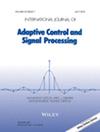Multi‐step performance degradation prediction method for proton‐exchange membrane fuel cell stack using 1D convolution layer and CatBoost
IF 3.9
4区 计算机科学
Q2 AUTOMATION & CONTROL SYSTEMS
International Journal of Adaptive Control and Signal Processing
Pub Date : 2024-06-14
DOI:10.1002/acs.3860
引用次数: 0
Abstract
The increasing environmental issues such as climate change and air pollution require energy saving and emission reduction in various fields, such as manufacturing, building, and transportation. To address the above problem, proton‐exchange membrane fuel cells (PEMFC) gradually become promising green energy conversion device due to the advantages of zero pollution, high efficiency, and low operating noise. However, the durability problem has extremely limited the PEMFC large‐scale commercial application. To prolong the service life of PEMFC, performance degradation prediction is an effective method. This paper proposes a multi‐step performance degradation prediction method for proton‐exchange membrane fuel cells based on CatBoost feature selection, convolution computing, and interactive learning mechanism. CatBoost is used to evaluate the importance of the monitor parameters on performance degradation. The evaluation results and PEMFC degradation mechanism analyses are used to select the monitor parameters for construing the prediction model. Based on the 1D convolutional layer and the interactive learning mechanism, the prediction model is proposed to extract the deep features from the monitor data to predict the performance degradation of the fuel cell system. In particular, the multi‐step prediction is performed by the configurable sliding window. The effectiveness of the proposed method is verified on real experiment datasets, and the experiment results show that the proposed method is particularly effective for multi‐step degradation prediction and decreases the computation by feature selection and 1D convolution layer.使用一维卷积层和 CatBoost 的质子交换膜燃料电池堆多步骤性能退化预测方法
气候变化和空气污染等环境问题日益严重,要求在制造、建筑和交通等各个领域实现节能减排。为解决上述问题,质子交换膜燃料电池(PEMFC)以其零污染、高效率、低噪音等优点逐渐成为前景广阔的绿色能源转换设备。然而,耐用性问题极大地限制了质子交换膜燃料电池的大规模商业应用。为了延长 PEMFC 的使用寿命,性能退化预测是一种有效的方法。本文提出了一种基于 CatBoost 特征选择、卷积计算和交互式学习机制的质子交换膜燃料电池多步骤性能退化预测方法。CatBoost 用于评估监测参数对性能退化的重要性。评估结果和 PEMFC 退化机理分析用于选择监测参数以构建预测模型。基于一维卷积层和交互式学习机制,提出了预测模型,从监测数据中提取深度特征来预测燃料电池系统的性能退化。其中,多步预测是通过可配置的滑动窗口进行的。实验结果表明,提出的方法对多步骤退化预测特别有效,并通过特征选择和一维卷积层减少了计算量。
本文章由计算机程序翻译,如有差异,请以英文原文为准。
求助全文
约1分钟内获得全文
求助全文
来源期刊
CiteScore
5.30
自引率
16.10%
发文量
163
审稿时长
5 months
期刊介绍:
The International Journal of Adaptive Control and Signal Processing is concerned with the design, synthesis and application of estimators or controllers where adaptive features are needed to cope with uncertainties.Papers on signal processing should also have some relevance to adaptive systems. The journal focus is on model based control design approaches rather than heuristic or rule based control design methods. All papers will be expected to include significant novel material.
Both the theory and application of adaptive systems and system identification are areas of interest. Papers on applications can include problems in the implementation of algorithms for real time signal processing and control. The stability, convergence, robustness and numerical aspects of adaptive algorithms are also suitable topics. The related subjects of controller tuning, filtering, networks and switching theory are also of interest. Principal areas to be addressed include:
Auto-Tuning, Self-Tuning and Model Reference Adaptive Controllers
Nonlinear, Robust and Intelligent Adaptive Controllers
Linear and Nonlinear Multivariable System Identification and Estimation
Identification of Linear Parameter Varying, Distributed and Hybrid Systems
Multiple Model Adaptive Control
Adaptive Signal processing Theory and Algorithms
Adaptation in Multi-Agent Systems
Condition Monitoring Systems
Fault Detection and Isolation Methods
Fault Detection and Isolation Methods
Fault-Tolerant Control (system supervision and diagnosis)
Learning Systems and Adaptive Modelling
Real Time Algorithms for Adaptive Signal Processing and Control
Adaptive Signal Processing and Control Applications
Adaptive Cloud Architectures and Networking
Adaptive Mechanisms for Internet of Things
Adaptive Sliding Mode Control.

 求助内容:
求助内容: 应助结果提醒方式:
应助结果提醒方式:


